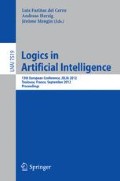Abstract
Recently, a temporal extension of the argumentation defeasible reasoning system \(\mbox{\textsf{DeLP}}\) has been proposed. This system, called \(\mbox{\textsf{t-DeLP}}\), allows to reason defeasibly about changes and persistence over time but does not offer the possibility of ranking defeasible rules according to criteria of preference or certainty (in the sense of belief). In this contribution we extend \(\mbox{\textsf{t-DeLP}}\) by allowing to attach uncertainty weights to defeasible temporal rules and hence stratifying the set of defeasible rules in a program. Technically speaking, weights are modelled as necessity degrees within the frame of possibility theory, a qualitative model of uncertainty.
Access this chapter
Tax calculation will be finalised at checkout
Purchases are for personal use only
Preview
Unable to display preview. Download preview PDF.
References
Alsinet, T., Béjar, R., Godo, L.: A characterization of collective conflict for defeasible argumentation. In: Proc. of COMMA 2010, pp. 27–38 (2010)
Alsinet, T., Chesñevar, C.I., Godo, L., Sandri, S., Simari, G.R.: Formalizing argumentative reasoning in a possibilistic logic programming setting with fuzzy unification. Int. J. Approx. Reasoning 48(3), 711–729 (2008)
Alsinet, T., Chesñevar, C.I., Godo, L., Simari, G.R.: A Logic Programming Framework for Possibilistic Argumentation: Formalization and Logical Properties. Fuzzy Sets and Systems 159, 1208–1228 (2008)
Andréka, H., Ryan, M., Schobbens, P.Y.: Operators and laws for combining preference relations. J. of Logic and Computation 12(1), 13–53 (2002)
Augusto, J.: Simari G. R. Temporal Defeasible Reasoning. Knowledge and Information Systems 3, 287–318 (2001)
Billington, D.: Defeasible logic is stable. J. of Logic and Computation 3, 379–400 (1993)
Caminada, M., Amgoud, L.: On the evaluation of argumentation formalisms. Artificial Intelligence 171, 286–310 (2007)
Capobianco, M., Simari, G.R.: A Proposal for Making Argumentation Computationally Capable of Handling Large Repositories of Uncertain Data. In: Godo, L., Pugliese, A. (eds.) SUM 2009. LNCS, vol. 5785, pp. 95–110. Springer, Heidelberg (2009)
Cobo, L., Martínez, D., Simari, G.R.: On Admissibility in Timed Abstract Argumentation Frameworks. In: Proc. of ECAI 2010, pp. 1007–1008. IOS Press (2010)
Dubois, D., Lang, J., Prade, H.: Timed possibilistic logic. Fundamenta Informaticae 15(3-4), 211–234 (1991)
Dubois, D., Prade, H.: Possibilistic logic: a retrospective and prospective view. Fuzzy Sets and Systems 144(1), 3–23 (2004)
Dung, P.: On the acceptability of arguments and its fundamental role in nonmonotonic reasoning, logic programming and n-person games. Artificial Intelligence 77(2), 321–357 (1995)
García, A., Simari, G.R.: Defeasible logic programming: An argumentative approach. Theory and Practice of Logic Programming 4(1+2), 95–138 (2004)
Governatori, G., Terenziani, P.: Temporal Extensions to Defeasible Logic. In: Orgun, M.A., Thornton, J. (eds.) AI 2007. LNCS (LNAI), vol. 4830, pp. 476–485. Springer, Heidelberg (2007)
Mann, N., Hunter, A.: Argumentation Using Temporal Knowledge. In: Proc. of COMMA 2008, pp. 204–215. IOS Press (2008)
Nute, D.: Defeasible logic. In: Handbook of Logic in Artificial Intelligence and Logic Programming, vol. 3, pp. 353–395. Oxford University Press (1994)
Pardo, P., Godo, L.: t-DeLP: A Temporal Extension of the Defeasible Logic Programming Argumentative Framework. In: Benferhat, S., Grant, J. (eds.) SUM 2011. LNCS, vol. 6929, pp. 489–503. Springer, Heidelberg (2011)
Author information
Authors and Affiliations
Editor information
Editors and Affiliations
Rights and permissions
Copyright information
© 2012 Springer-Verlag Berlin Heidelberg
About this paper
Cite this paper
Godo, L., Marchioni, E., Pardo, P. (2012). Extending a Temporal Defeasible Argumentation Framework with Possibilistic Weights. In: del Cerro, L.F., Herzig, A., Mengin, J. (eds) Logics in Artificial Intelligence. JELIA 2012. Lecture Notes in Computer Science(), vol 7519. Springer, Berlin, Heidelberg. https://doi.org/10.1007/978-3-642-33353-8_19
Download citation
DOI: https://doi.org/10.1007/978-3-642-33353-8_19
Publisher Name: Springer, Berlin, Heidelberg
Print ISBN: 978-3-642-33352-1
Online ISBN: 978-3-642-33353-8
eBook Packages: Computer ScienceComputer Science (R0)

